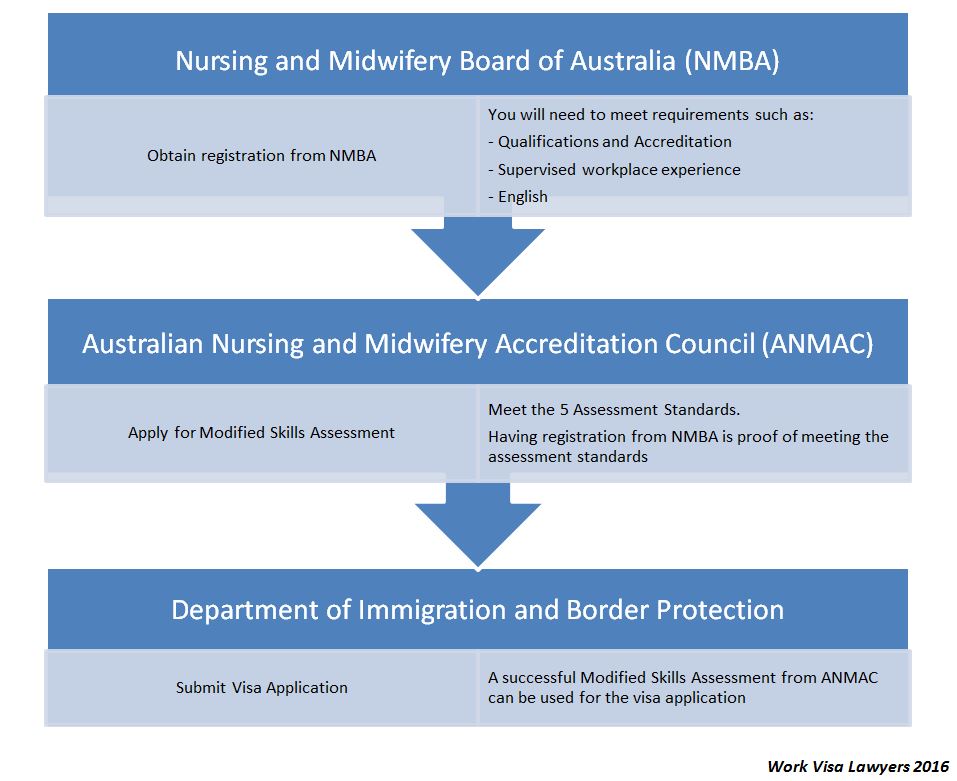Working as a Registered Nurse or Midwife in Australia
If you are an Internationally Qualified Nurse or Midwife and want to work in Australia as a registered nurse or midwife, you may be eligible to get registered in Australia and apply for an Australian visa. The demand for skilled nurses remains high in Australia.
In the 189 Skilled Independent visa invitation rounds in 2023, nurses have been the biggest winners.
The following occupations received invitations at the minimum 65 points:
254111 Midwife
254412 Registered Nurse (Aged Care)
254413 Registered Nurse (Child and Family Health)
254414 Registered Nurse (Community Health)
254415 Registered Nurse (Critical Care and Emergency)
254416 Registered Nurse (Developmental Disability)
254417 Registered Nurse (Disability and Rehabilitation)
254421 Registered Nurse (Medical Practice)
254418 Registered Nurse (Medical)
254422 Registered Nurse (Mental Health)
254425 Registered Nurse (Paediatrics)
254423 Registered Nurse (Perioperative)
254424 Registered Nurse (Surgical)
254499 Registered Nurses nec
The registration process includes 3 different steps
- Get registered with the Nursing and Midwifery Board of Australia (AHPRA)
- Skills assessment from Australian Nursing & Midwifery Accreditation Council (ANMAC)
- Apply for the visa (Department of Home Affairs)
What are the requirements for registration?
- Successfully completed the nursing education
- Qualification is equivalent to Australian bachelor’s degree (AQF level 7)
- Have at least 800 hours of workplace experience in different health care settings
- Certification from educational institute that proves of completing an assessment in medication administration and management
- IELTS 7, PTE 65 & TOEFL 88 overall score and not less than that in any band
- Professional’s skills and knowledge are up-to-date by meeting the recency of practice registration standard
- Criminal history checked

If you meet the requirements, then here is your Guide to the Registration:
- Self-assessment with Australian Health Practitioner Regulation Agency – AHPRA
- On the basis of your self-assessment, you will be assigned to the stream A, B or C by Nursing and Midwifery Board of Australia (NMBA) after an initial assessment.
- Stream A: Candidates who hold a qualification that is relevant but not significantly equivalent to an Australian approved qualification and satisfy the compulsory registration standards. You'll need to pay the assessment fee and complete Orientation Part 1 before completing the Portfolio stage.
- Stream B:Applicants who hold a qualification that is not significantly equivalent to an Australian approved qualification and satisfy the compulsory registration standards. It's recommended that you end your participation in the assessment process and upgrade your qualification if you wish to continue.
- Stream C: Not fitting in A or B stream.
- Once you are assigned to the stream A, B OR C then proceed further according to the stream.
- Proceed for the Internationally Qualified Nurses and Midwives (IQNM) assessment process and pay the IQNM Assessment Fee.
- Attend the Orientation Part 1 – It is an online learning course providing an introduction to Australia and the Australian healthcare context.
- Portfolio (This is where you will be supplying the qualification and identification details and documentation.
- Attend Multiple Choices Question (MCQ) exam (MCQ Exam is a computer-based multiple-choice test, undertaken at a Pearson VUE testing centre).
- Objective Structured Clinical Examination (OSCE). It is a clinical exam to assess the candidate’s knowledge, skills and competence at the graduate-level nurse or midwife.
Candidates who have successfully completed the Orientation Part 1, Portfolio, MCQ exam and the OSCE exam are now eligible to apply for registration in Australia.
If you are ready you can commence the self-check here.
How can I apply for registration once I am eligible?
Once you are eligible to apply for registration, the application form for the registration will be made available within your dashboard.
You can access the form and lodge the application.
What happens next?
APRAH will review and verify your qualifications, proof of Identity and other documentation.
The NMBA will decide whether to approve your registration, propose to register with conditions, or propose to refuse your application. You will be notified the outcome by email of registration if your residential address is in Australia, or via a letter of in principle approval of registration if you are currently living overseas.
What is in principle registration?
If you have met all registration requirements, but only provided the minimum proof of identity evidence with your application (because you were not living in Australia at that time), the NMBA will provide you with a letter providing in principle approval for registration, valid for three months, and detailing the outstanding proof of identity requirements. This does not mean that you are registered.
What is the propose to register with conditions?
If your registered nursing qualification is assessed at less than Australian Qualification Framework level 7, you will not meet the requirements for registration. However, if you hold a qualification that:
- is solely in mental health, paediatric or disability nursing
- meets all criteria under the current model for registration, except criterion 3 (that your qualification is at AQF level 7 or above)
- is at AQF level 6, and
- meet all registration standards
- the NMBA will grant registration with conditions, which will require a period of 12 months full time equivalent supervised practice. You will also have a notation on your registration.
What is the next step after registration?
You need to get you skills assessment done from Australian Nursing & Midwifery Accreditation Council (ANMAC).
When can I apply for the visa?
Once you have a positive skills assessment from ANMAC, you will be eligible to apply for an appropriate visa.
Summary:
STEP 1 - Check the requirements for the registration
STEP 2 - Check the requirements for the immigration
STEP 3 - Complete the Self-assessment
STEP 4 - Complete the orientation part 1 successfully (Stream A)
STEP 5 - Complete the orientation part 1, portfolio, MCQ and OSBE exam (Stream B)
STEP 6 - Lodge an application for registration and provide all documentations to AHPRA
STEP 7 - Apply to be registered with NMBA
STEP 8 - Receive registration
STEP 9 - Get the skills assessed at ANMAC
STEP 10 - Apply for a visa
STEP 11 - Move to AUSTRALIA, get a job and work and live here.
Do you need help with your Visa application?
Our team of experienced Immigration Lawyers and Migration Agents is ready to assist you with your visa application.
Based in Adelaide, South Australia, we provide Australian immigration advice to people and businesses from all over the world.
You can book an appointment online or call us at (+61) 8 8351 9956.
About the Author: Wendy Guan – Registered Migration Agent in Adelaide South Australia








